Nidhi’s
Ayurvedic Nutrition Certification
Program Curriculum
Part A
Learning from the Ancient Sources
The first part dives deep into Ayurvedic concepts related to nutrition, digestion, rules of dietetics, and specific food groups and substances.
Intricate, nuanced, and fascinating, each verse is referenced directly from the Sanskrit texts - nothing is diluted or lost in translation.
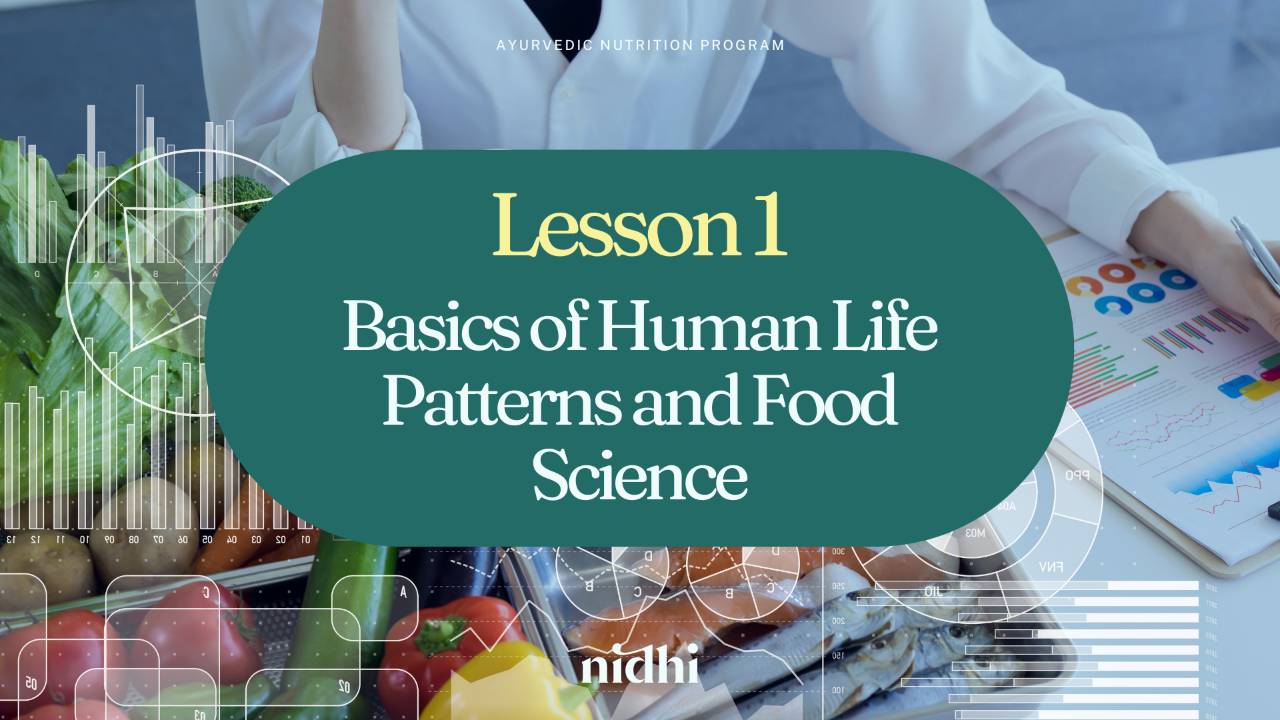
Lesson 01: Basics of Human Life Patterns and Food Science
Source: Ayushkamiya Adhyay (Ch. 1- AH)
Date: Oct 22nd, 11 - 1:30 PM EST
Discover the timeless principles that connect your body and food:
- The chemistry and biology of the three Doshas, or body functions, and how they define our current state of health
- The building blocks of life - tissues of your body, bowels, sweat, and their role in balance. (Dhatus and Mala)
- The six tastes (rasa) and how they shape digestion, energy, and mood
- Food is more than calories - it's (Virya) potency, qualities, and lasting impact
- Ayurvedic Food Psychology - The link between mind, food, and disease
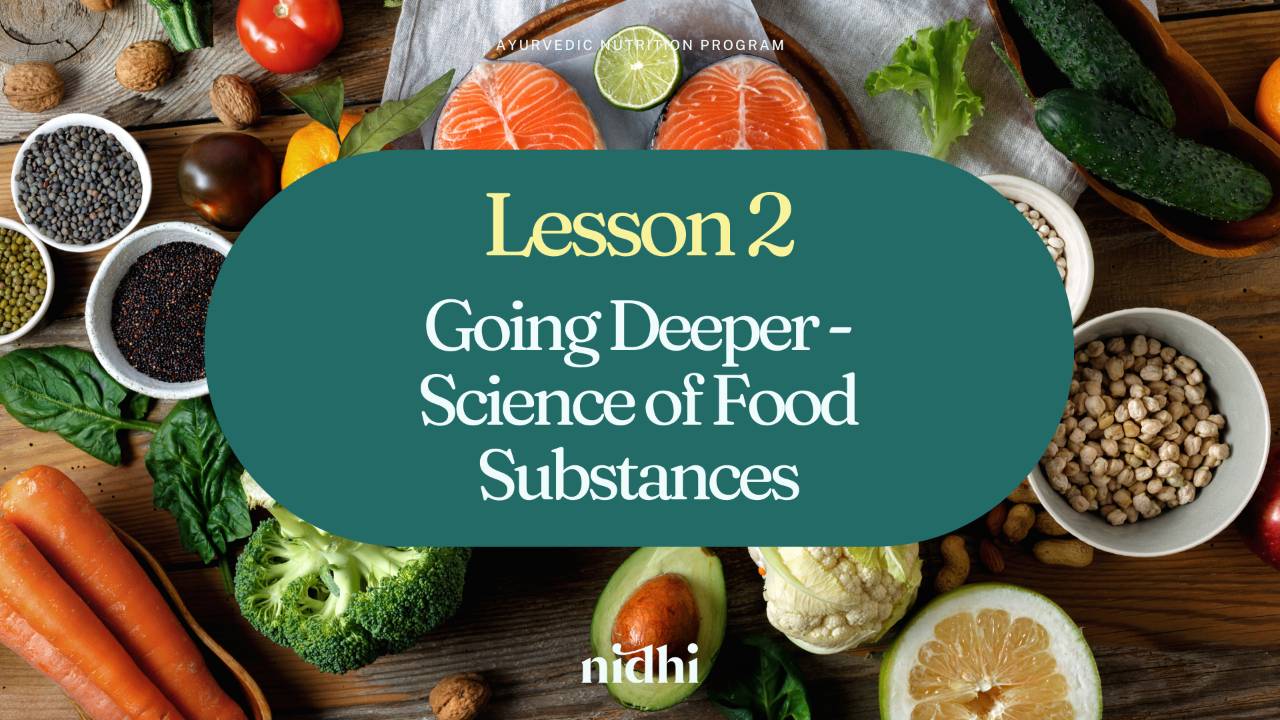
Lesson 02: The New Food Lens - Building A Framework to Understand Foods for their entire potential
Source: Chapter 9 - AH - Dravyadi Vijnaniya (Ch. 9- AH) + (Rasabhediya Adhyaya Ch. 10 - AH)
Date: Oct 29th, 11 - 1:30 PM EST
Take a deeper look at how food truly works inside the body:
- How every substance is shaped by elemental dominance and how this affects its breakdown.
- Understanding potency - the unique power each food carries intuitively.
- The post-digestive effect (Vipak) - what a food can do to your microbiome or gut environment after it has been metabolized.
- Foods that carry special properties.
- The six tastes revisited and analyzed further, including how to use them wisely in daily life (which tastes are warming, and which can contribute to inflammation).
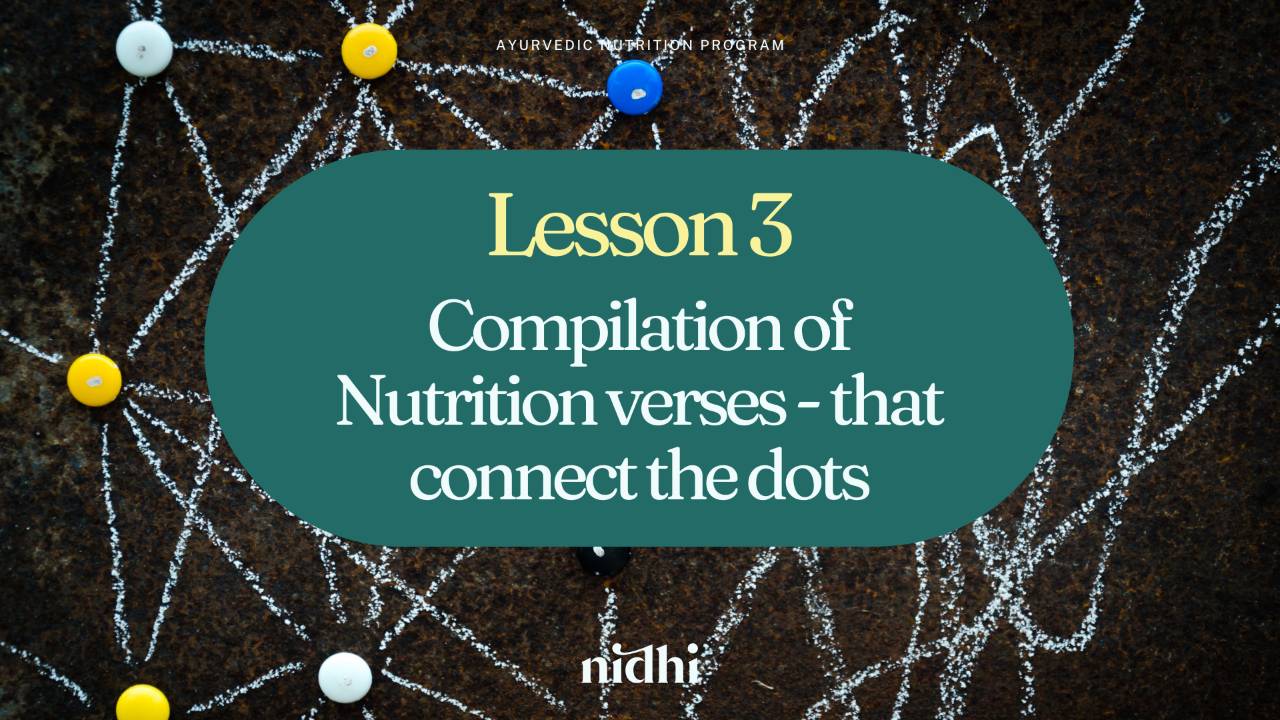
Lesson 03: Connecting the Dots with my favorite verses.
Date: Nov 5th, 11 - 1:30 PM EST
Explore my favorite “connect-the-dot” verses that link body, food, and health.
- Engage in revision and reflection to strengthen understanding.
- Learn practical tips to internalize these principles in everyday life.
- Discover revelations and subtle, mind-blowing nuances of Ayurvedic wisdom.
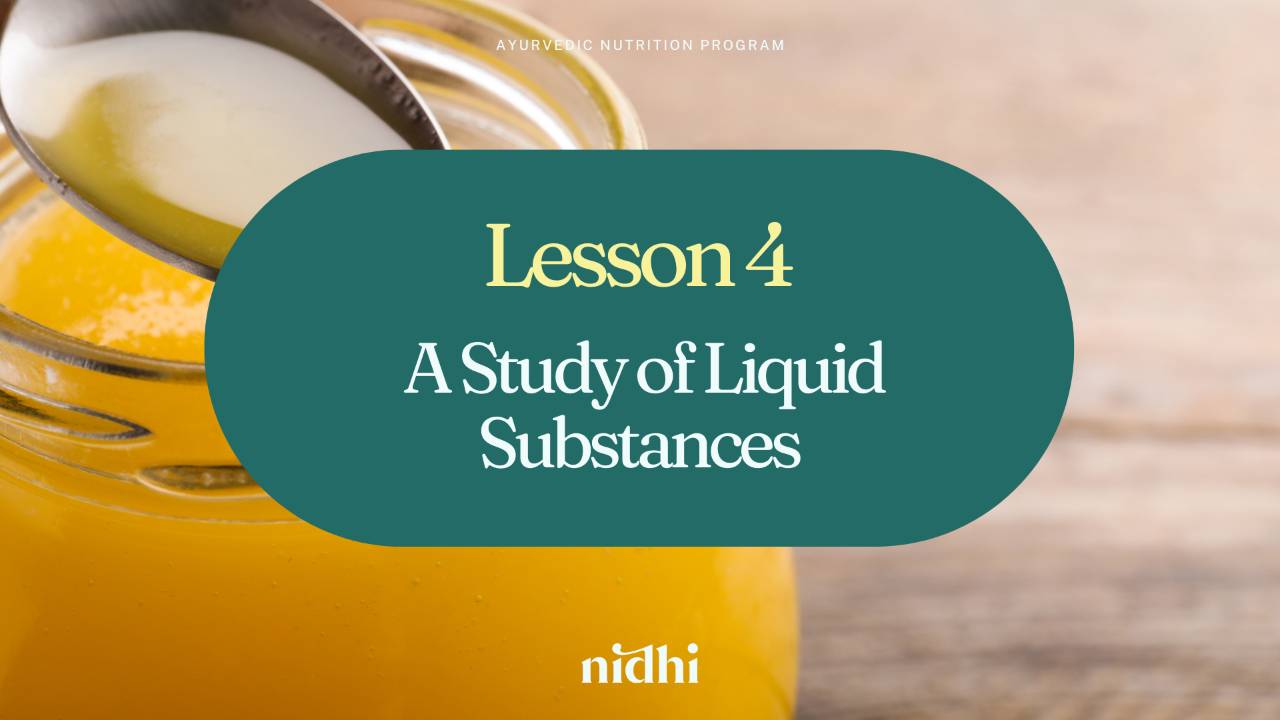
Lesson 04: Studying Fluid Foods (Water, milk etc)
Source: Drava-Dravya Vidnyan (Ch. 5 - AH)
Date: Nov 12th, 11 - 1:30 PM EST
Learn how fluids interact with your body and influence health:
- Does it matter what you drink?
- Understanding the properties and types of water, milk, oils, and ghee, and how to use them effectively.
- Sweeteners and their impact.
- Types of alcohol and what to know for balance and wellness.
- Beverages for each season and their purpose (TBC – Part 2).
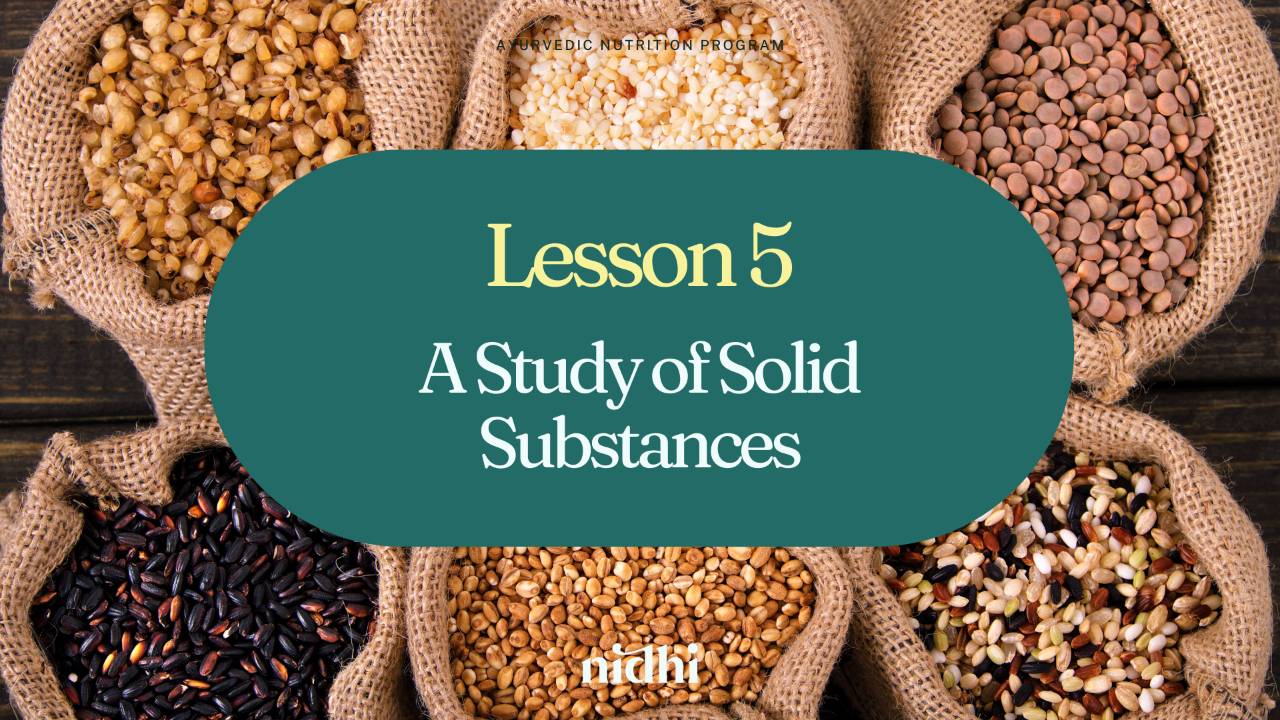
Lesson 05: A Study of Solid Food Substances
Source: Annasvarupa Vijnyana - A Study of Food Substances (Ch. 6 - AH)
Date: Nov 19th, 11 - 1 PM EST
You are what you eat, so learn the Ayurvedic chemistry of various foods and their impact on the body:
- How your body and digestion respond to different food groups.
- A deep dive into grains, beans, and legumes.
- Seeds, meats, vegetables, and fruits - understanding their unique effects
- Salts and select spices, and how they influence digestion and balance.
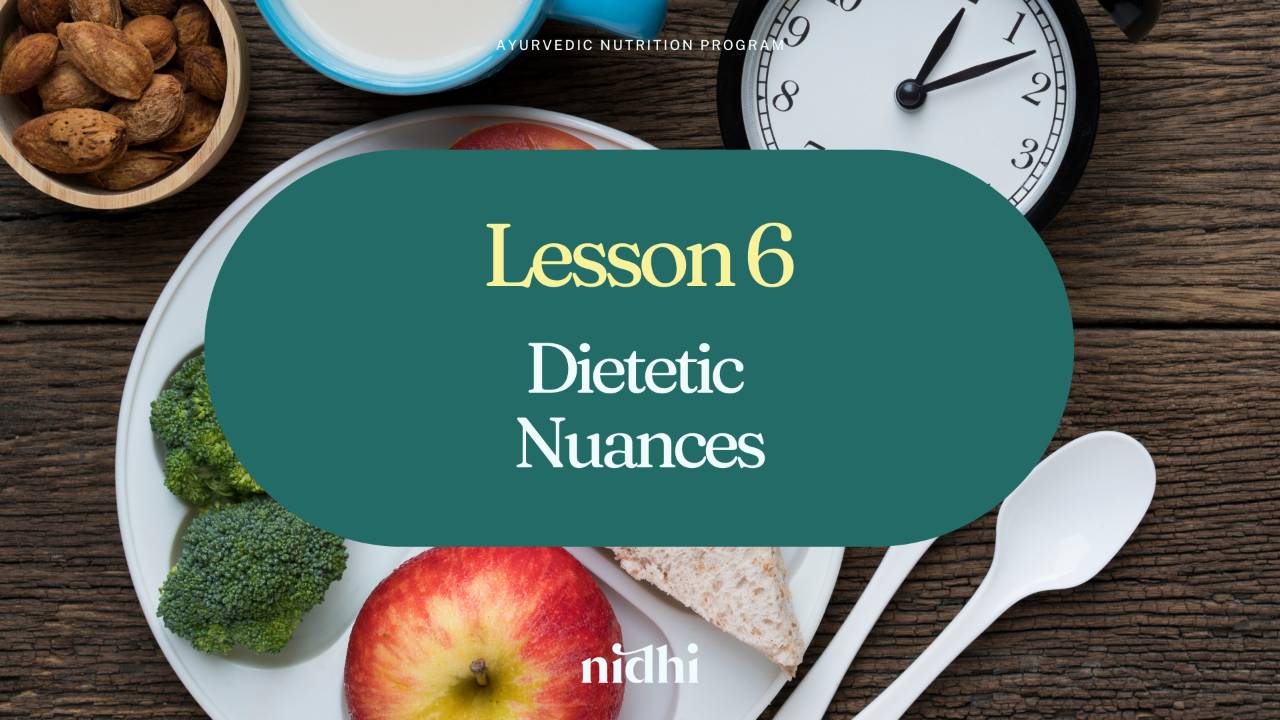
Lesson 06: Dietetic Nuances
Date: Nov 26th, 11 - 1:30 PM EST
This lesson takes you beyond “what to eat” into the how, when, and why of food:
- Best substances for various conditions (Agreya Sangraha).
- Universally recommended and avoided foods (Pathya – Apathya).
- How much to eat and the rules of water consumption.
- Meal sequence, timing, and portioning for optimal digestion.
- Foods that nourish, support weight management, and gentle weight loss/ depleting protocols.
- The concept and role of fasting.
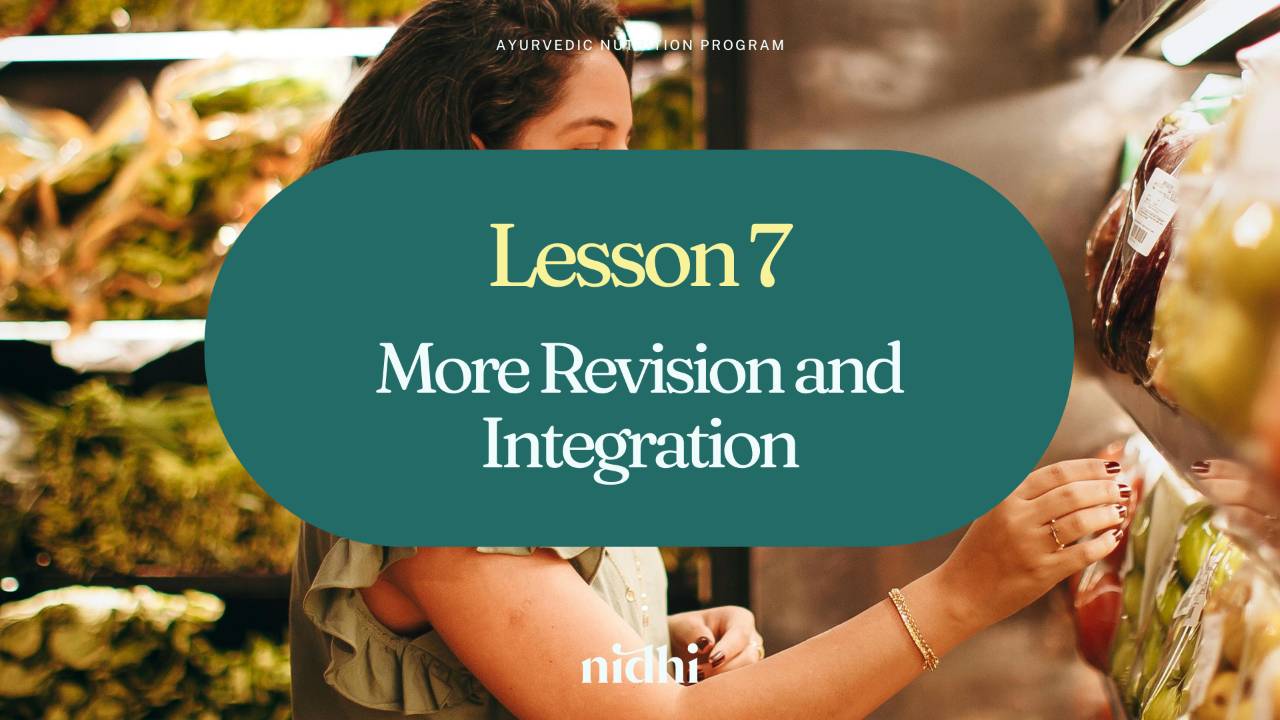
Lesson 07: More Revision and Integration
Source: Ahar from Charak Samhita and other texts
Date: Dec 3rd, 11 - 1:30 PM EST
- The true importance of food for health and vitality.
- Learn the 10 essential rules of food consumption.
- How tastes (rasa) influence digestion and bowel movements.
- Common incompatible foods to avoid and understand why.
- Why tasty, wholesome food matters for both body and mind.
- Food categories and their general effects on your body.
- How food can be modified to change its impact on the body.
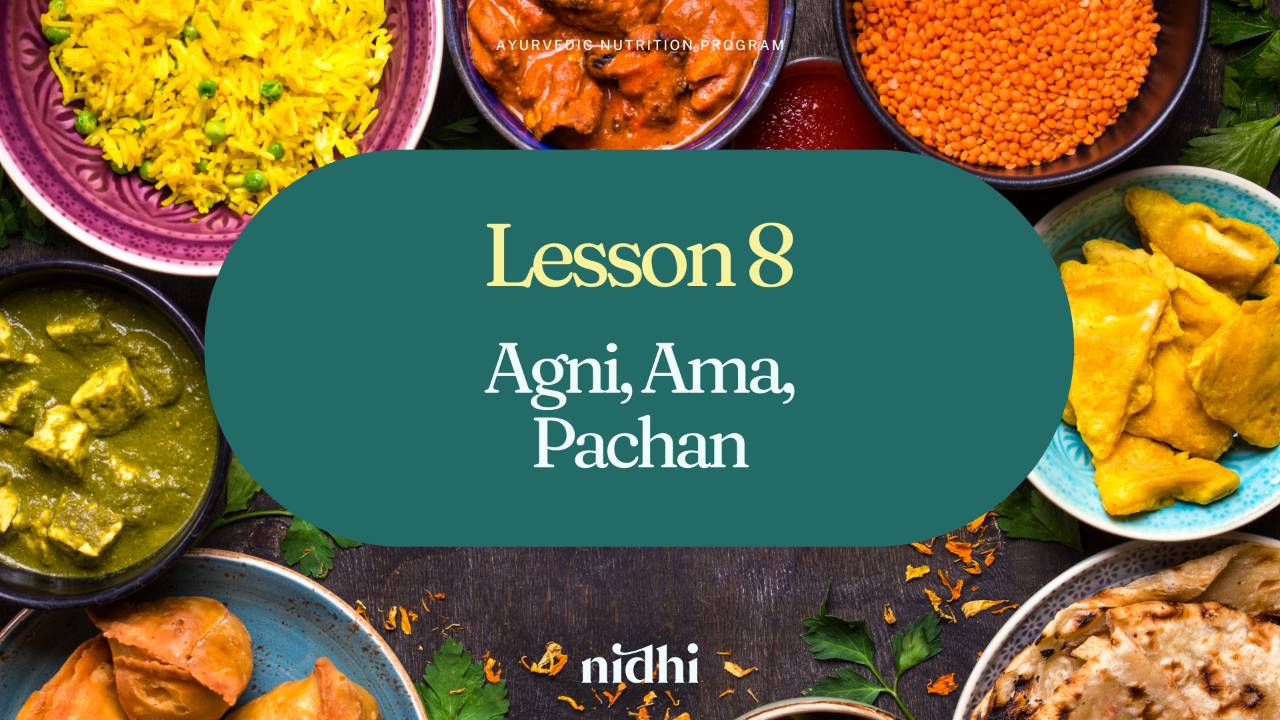
Lesson 08: Agni, Ama, Pachan
Date: Dec 10th, 11 - 1:30 PM EST
Understand the inner workings of your digestive system from an Ayurvedic perspective:
- Creating the optimal digestive environment
- How digestion (Agni) works and why it matters for overall health
- Identifying and addressing toxic waste (Ama) in the body
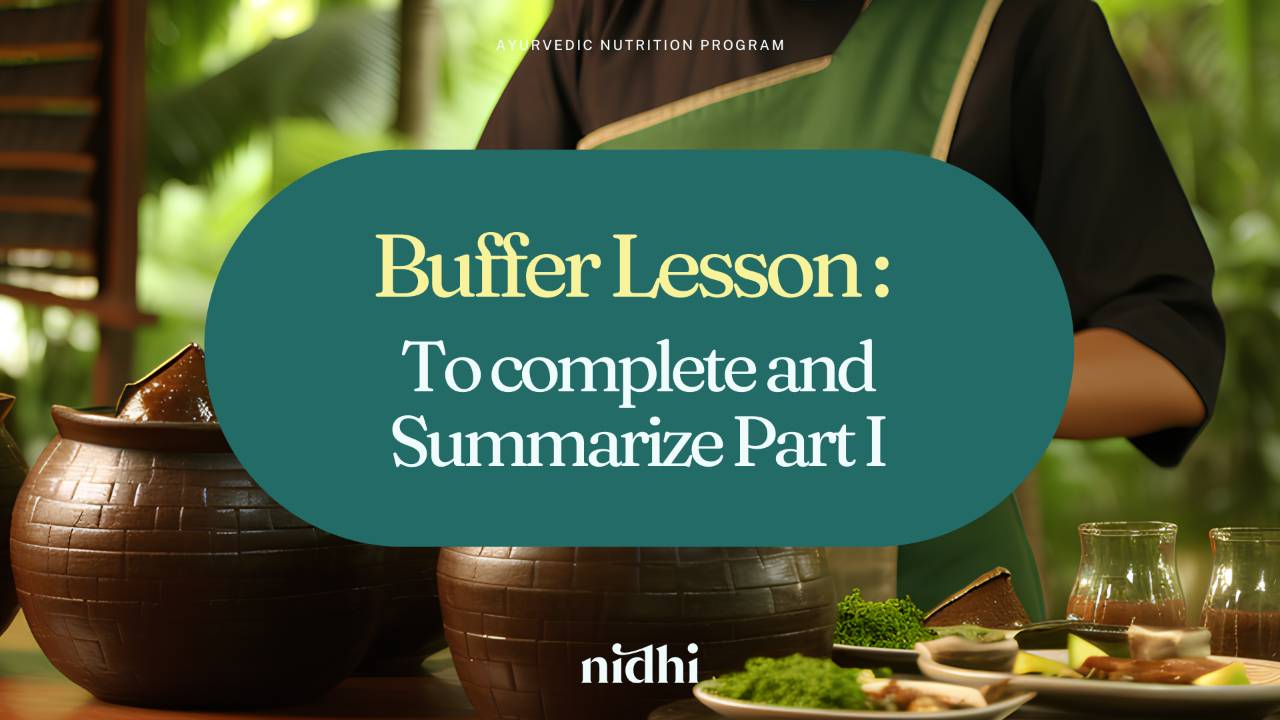
Buffer Lesson Day: Completing and Summarizing Part 01
Date: Dec 18th, 11 - 1:30 PM EST
Take time to consolidate your learning and strengthen your understanding:
- Deep dive into your metabolic fire - what fuels it and what weakens it
- How to detect, address, and clear Ama (toxicity) from the body
BREAK and INTEGRATION
Date: Dec 18th - Jan 9th

Buffer Lesson Day: Revision and Summarizing Part 01
Date: Jan 14th, 11 - 1:30 PM EST
We will explore the two fundamental treatment approaches.
Optional Track: Ayurveda & Modern Science
Dates TBD, 11 - 1:30 PM EST
For students or practitioners bridging worlds, this modern integration track includes:
- Gut-brain axis, neurotransmitters, microbiome, inflammation
- The Ayurvedic view of metabolic health (vs calorie counting)
- Why Ayurveda got digestion right centuries ago
- Intermittent fasting vs Langhana
- The science of ghee, oils, and good fats
→ Ideal for integrative nutritionists, functional medicine coaches, and anyone bridging East and West.
Part B
Application and Personalization
This part teaches how to make the nuanced food science of Ayurveda intuitive, so you can apply it in modern life with ease, helping yourself and others address specific conditions while finding true food freedom.
Food becomes both health and joy once you learn to bridge the gap between ancient wisdom and modern science.
Starts Jan 21st
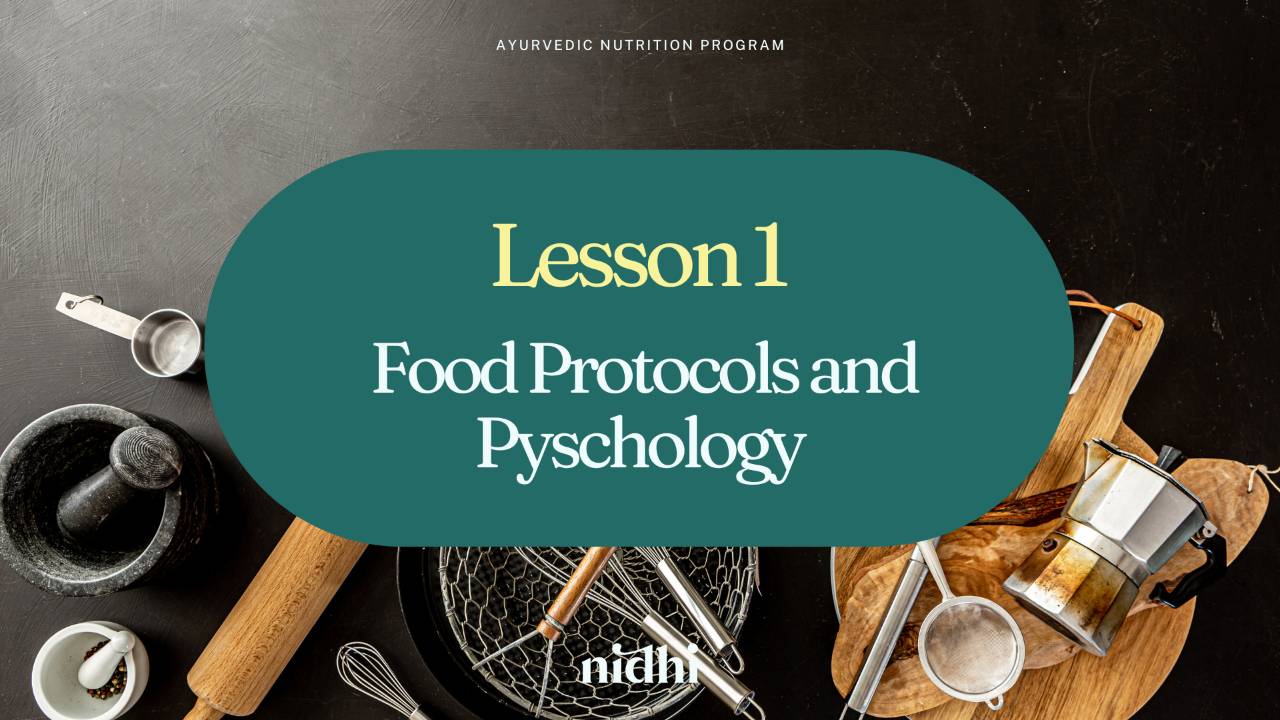
Lesson 01: Food Protocols and Psychology
Date: Jan 21st, 11 - 1:30 PM EST
- Smart eating habits - sequencing and mindset.
- Cookware, cooking methods, and kitchen tools that maximize nourishment.
- Modern food prep and storage tips that fit your lifestyle.
- The role of the mind in eating - handling stress, eating on the go, or in front of screens.
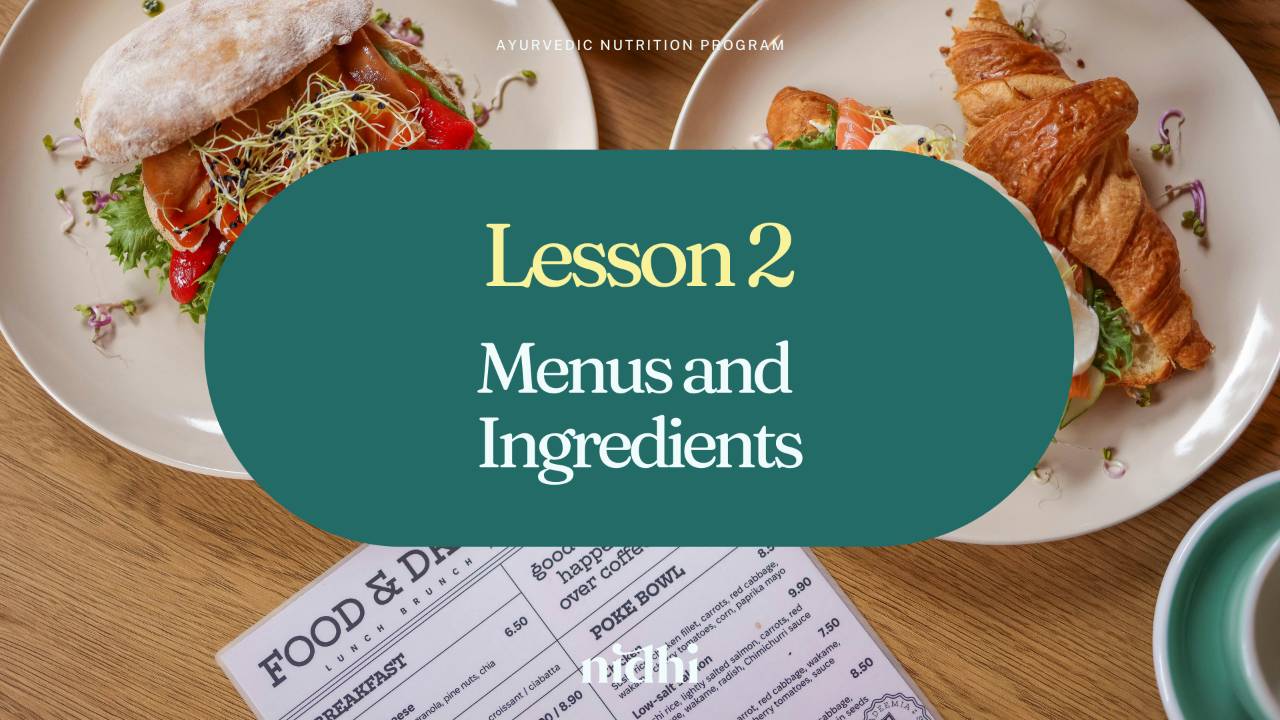
Lesson 02: Menus and Ingredients
Date: Jan 28th, 11 - 1:30 PM EST
Turn Ayurvedic principles into practical meal planning:
- Sample menus for breakfast, lunch, and dinner
- Choosing the right fats, healing herbs, and spices
- Smart grocery lists, pantry planning, and foods to avoid
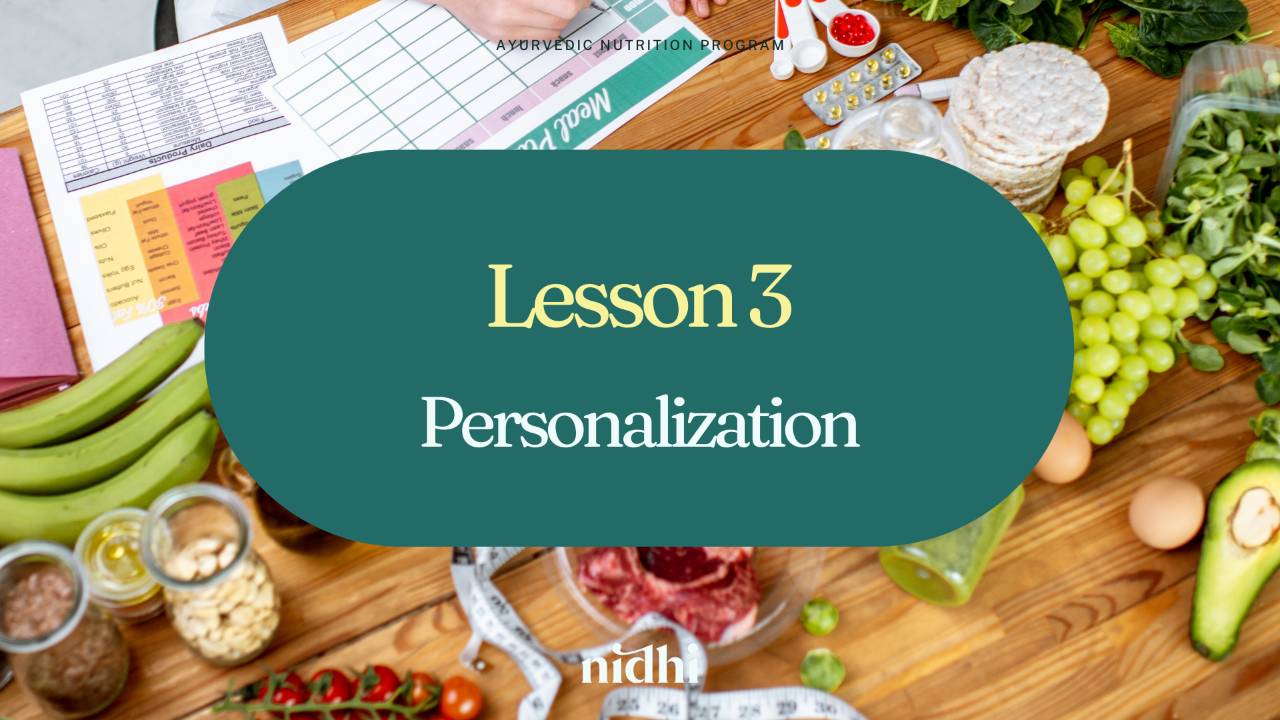
Lesson 03: Personalization
Date: Feb 4th, 11 - 1:30 PM EST
Learn how to tailor nutrition to individual needs:
- Client intake forms and Food-Symptom Pattern Mapping (FMP) for personalized guidance
- Assessing digestive fire (Agni) and your Inner Climate™
- Understanding food cravings - interpretation and support strategies
- Balancing cleansing and nourishing, food journaling, and managing emotional eating
- Tracking triggers and restoring trust with food
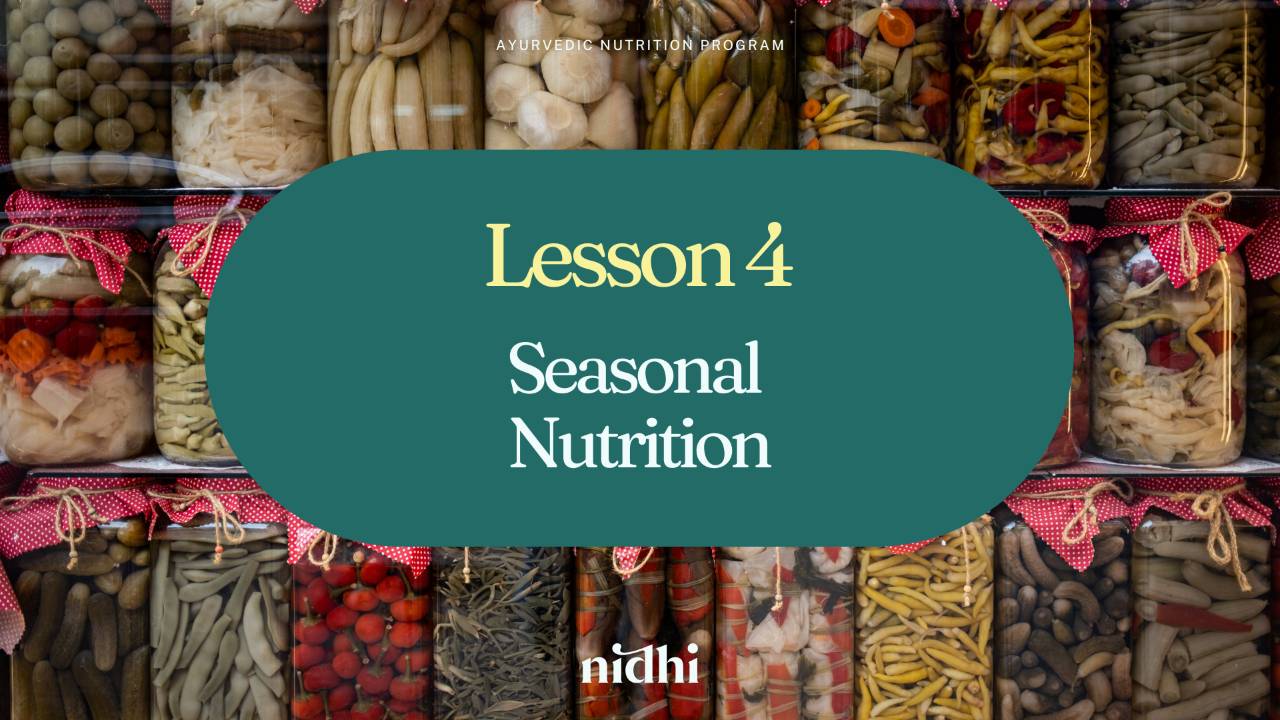
Lesson 04: Seasonal Nutrition
Source: Rituacharya (Ch. 3 – AH)
Date: Feb 11th, 11 - 1:30 PM EST
- Menus and drinks tailored for each season
- Gentle seasonal cleansing protocols
- Introduction to Rasayana (OG Adaptogen) therapy for rejuvenation and vitality
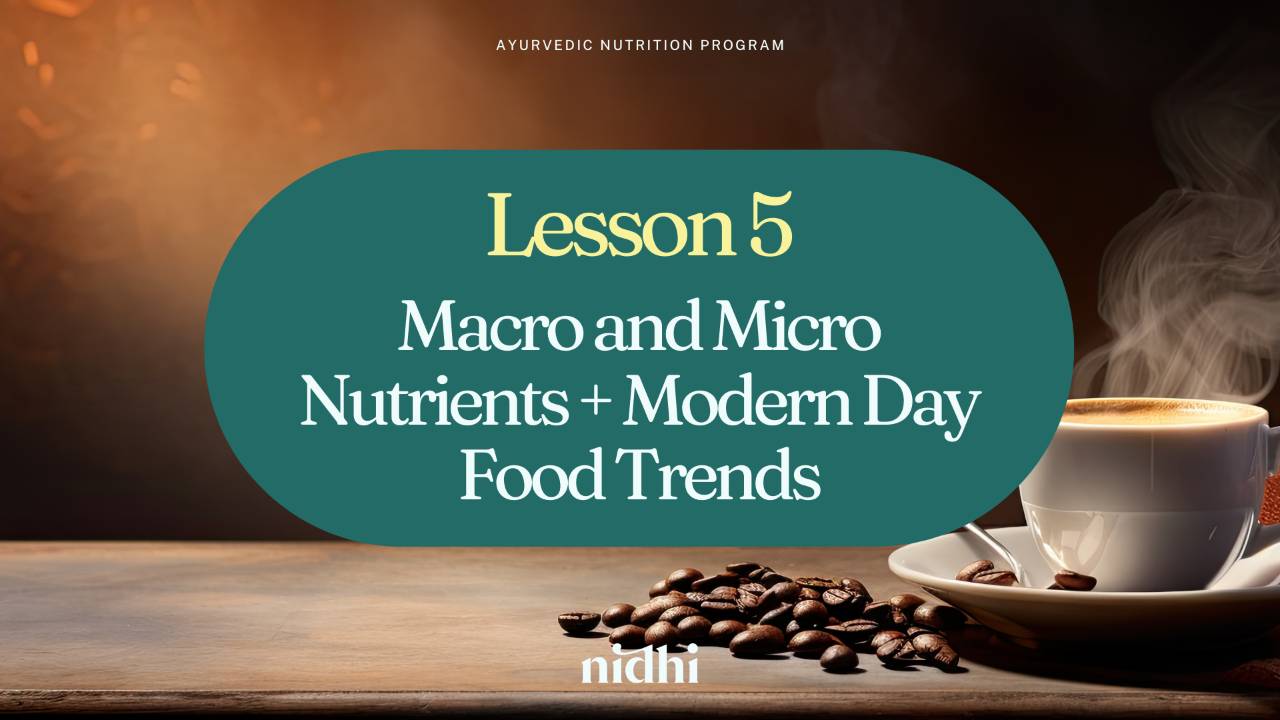
Lesson 05: Macro and Micro Nutrients + Modern Day Food Trends
Date: Feb 18th, 11 - 1:30 PM EST
- How Macronutrients - carbohydrates, protein, and fats function within Ayurvedic food wisdom
- Decode Micro Nutrients in Ayurvedic Food (Magnesium, Omega 3, etc)
- Learn how modern trends like bullet coffee, turmeric shots, and spirulina can be interpreted and used through an Ayurvedic lens.
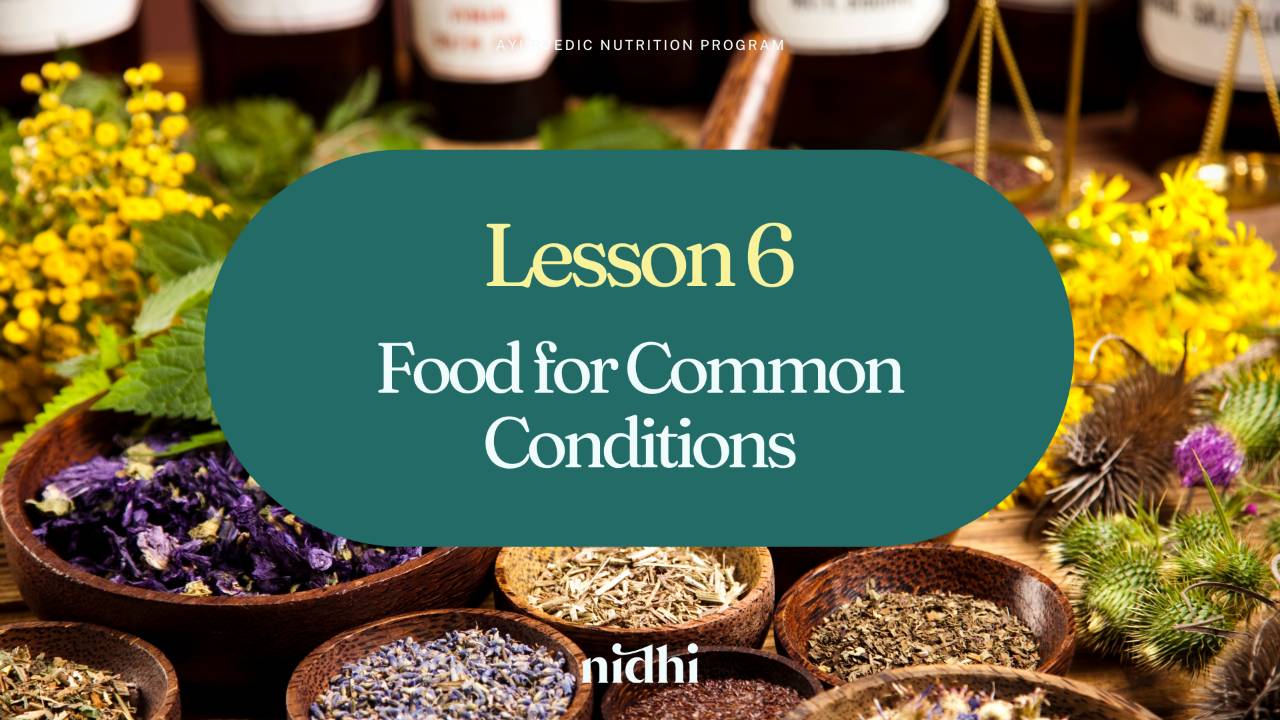
Lesson 06: Food for Common Conditions
Date: Feb 25th, 11 - 1:30 PM EST
- Learn which foods support the body during fevers, colds, and inflammation.
- Understand dietary approaches for managing diabetes, cholesterol, weight gain/ obesity, IBS, and migraines.
- Discover how to use food as medicine to address common modern-day ailments naturally.
Bonus Module
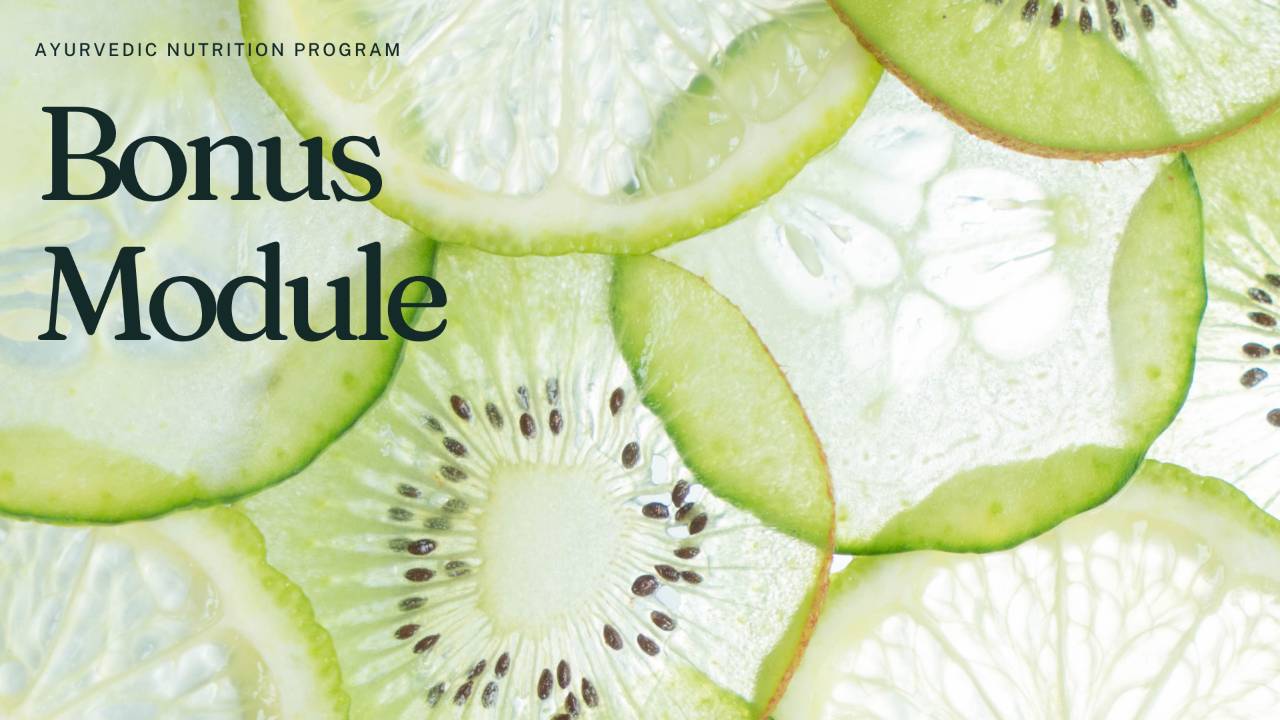
Bonus Optional Module: Ayurvedic Lifecycle Nutrition
Date: Mar 4th, 11 - 1:30 PM EST
A short but powerful module for women’s health and beyond. Food evolves with our life phases. This module includes:
- Nutrition for childhood, youth, adulthood, and elderhood
- Menstrual nutrition, Menopause care, and nourishment in aging
Part C
Application and Personalization
Support to Be Provided On Friday Calls - Mandatory Attendance - Starting Mar 6th
FINAL PRESENTATIONS AND SUBMISSIONS - April 1st (Thesis) and April 3rd (Client Practicum)
Starts Apr 1st (tentative)

Thesis Project - Choose one
- Analyze a traditional cuisine and compare it with the principles of Ayurveda.
- Study seasonal foods from different cultures through the lens of Ayurveda.
- Compare Ayurvedic and Traditional Chinese Medicine (TCM) dietary systems.
- Create a complete Ayurvedic meal protocol for a specific disease condition.
- Other topics may be added.
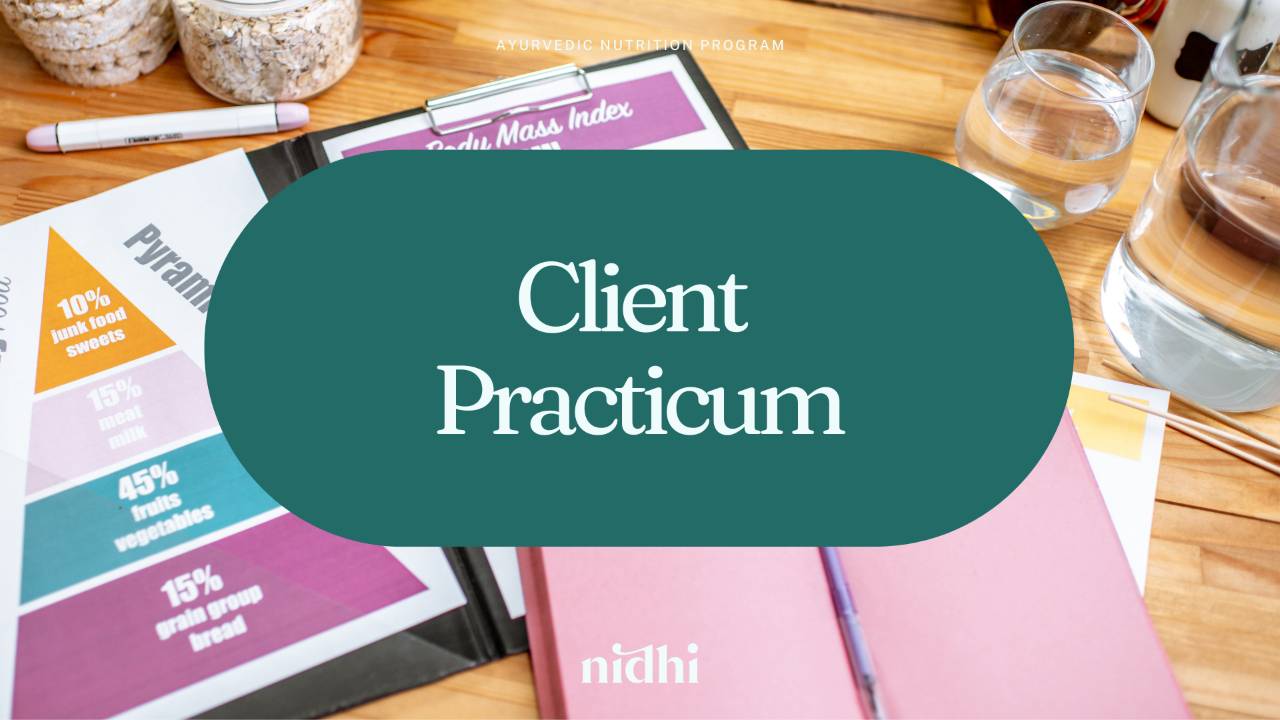
Client Practicum
Gain hands-on experience applying Ayurvedic principles in real-world settings and build confidence in personalized nutrition guidance.
- Work with at least 10 people to create detailed Ayurvedic nutrition plans tailored to their unique needs.
- Assess each client’s Agni, health concerns, and food history.
- Analyze if they need Agni support, cleansing, or nourishment.
- Do they need warmer, cooler, drier, or more moist foods?
- Document your rationale and design individualized meal roadmaps to guide them effectively.
Professional Practice Integration - Optional
For students stepping into practice.
Mar 11th, 11 - 1:30 PM EST
- Learn how to structure and conduct a client session effectively.
- Understand your scope of practice and what not to claim.
- Explore ethics, legal considerations, and maintaining professional boundaries.
- Gain skills for documenting client progress and providing thoughtful follow-ups.
- Learn how to collaborate with integrative health professionals.
- Discover strategies for finding your niche and building a practice rooted in integrity.
- Develop marketing tools and the mindset needed to grow a successful Ayurvedic nutrition practice.

